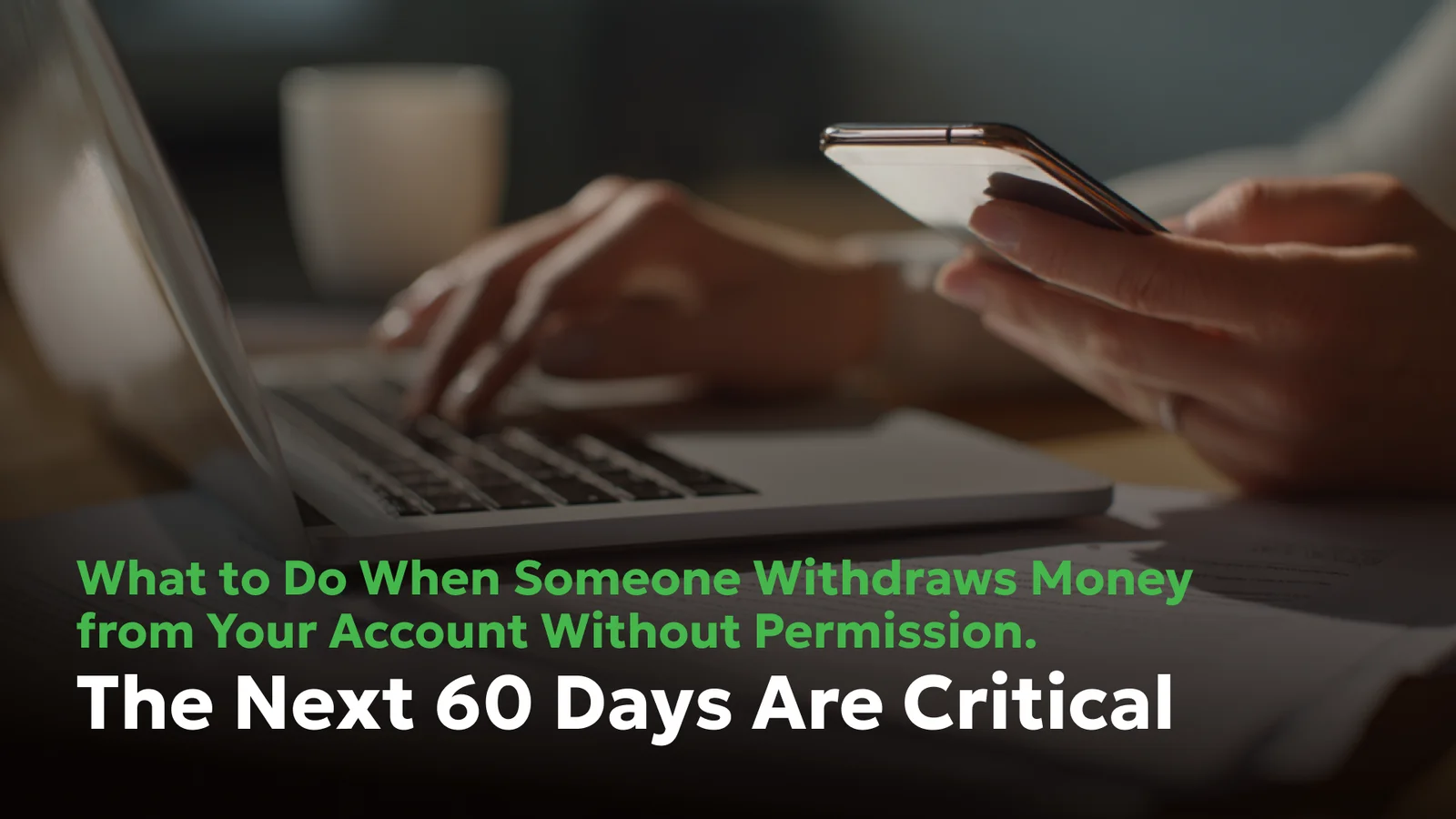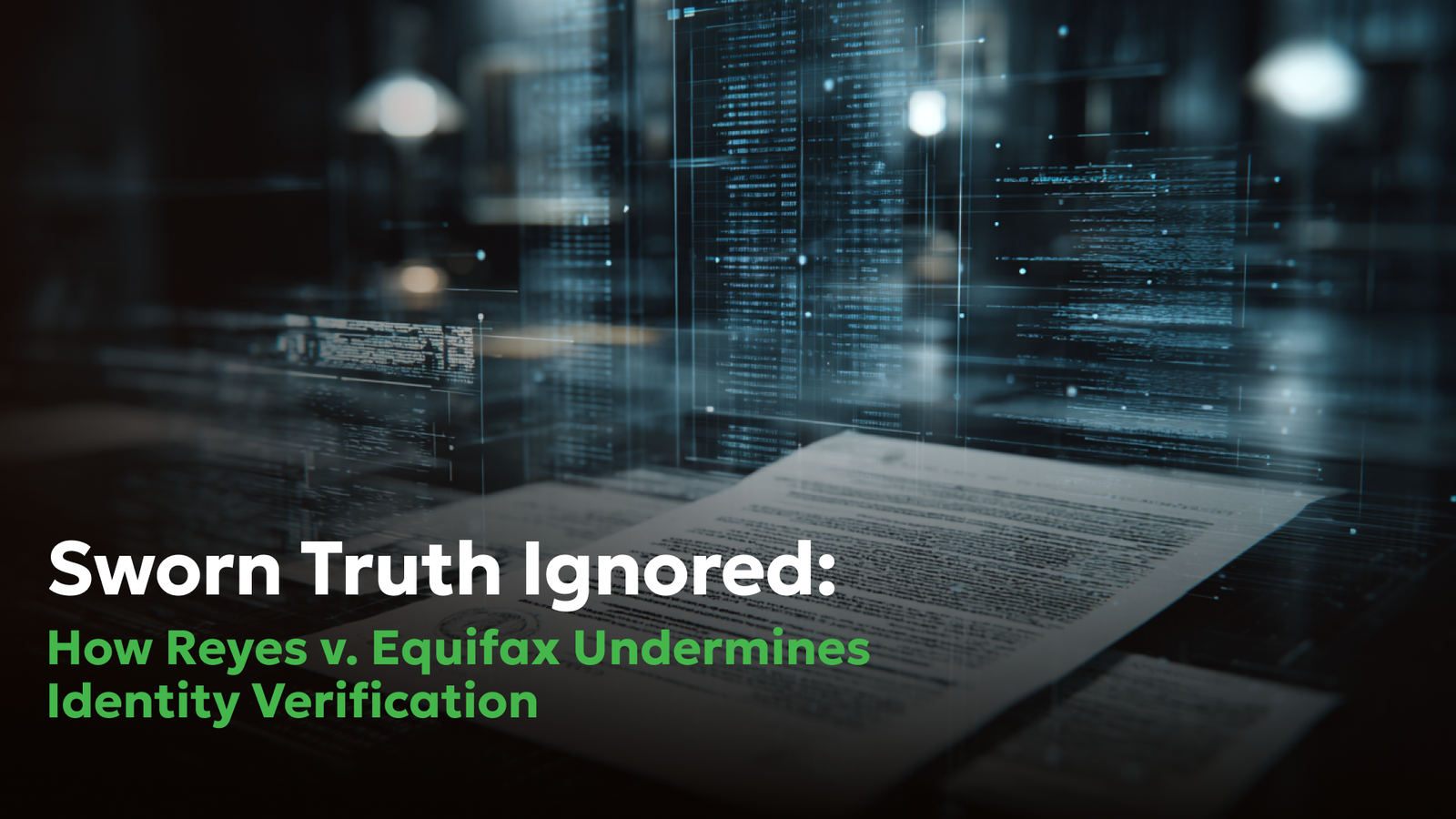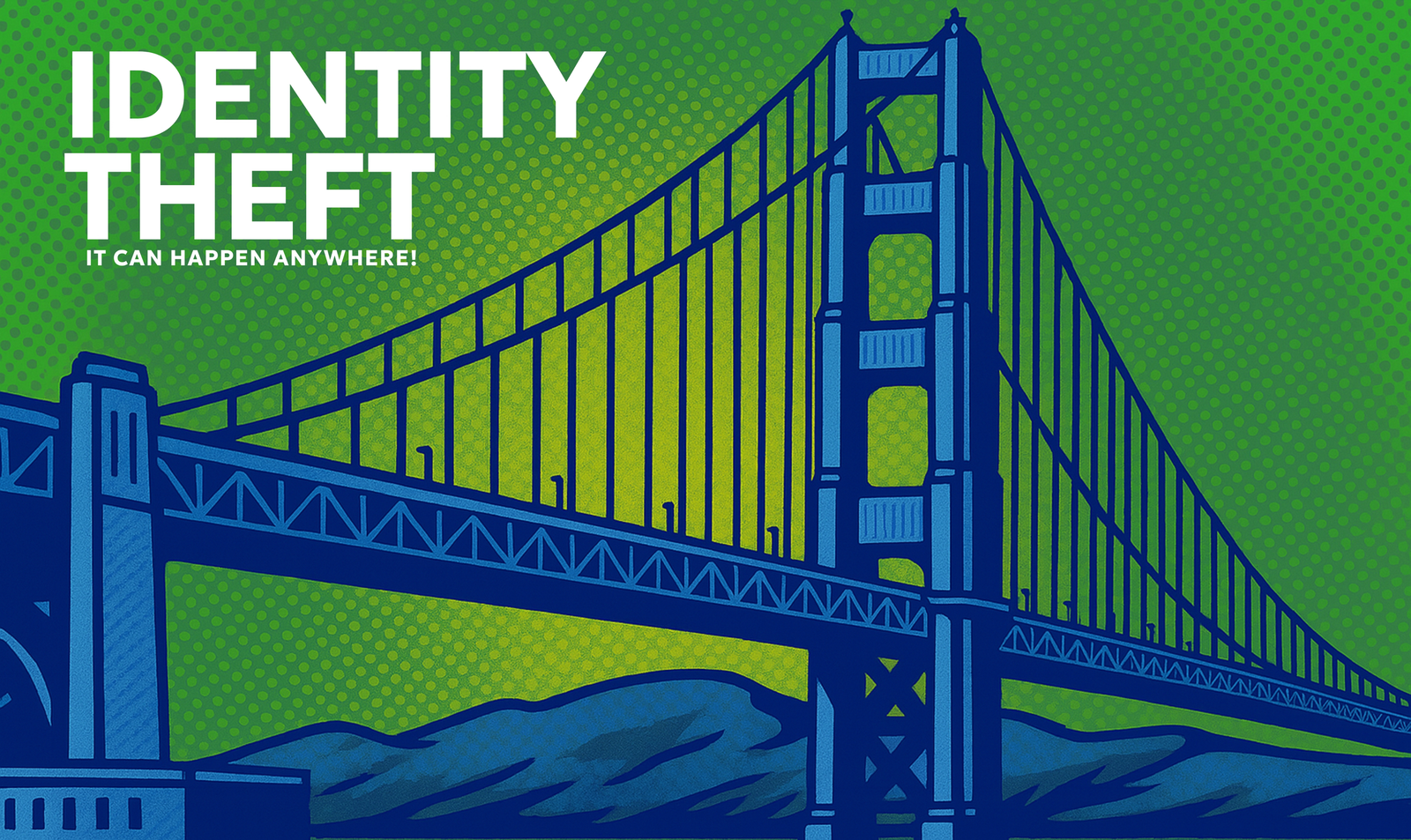What to Do When Someone Withdraws Money from Your Account Without Permission. The Next 60 Days Are Critical
What to Do When Someone Withdraws Money from Your Account Without Permission. The Next 60 Days Are Critical
- Blog
- Credit Report Identity Theft
What to Do When Someone Withdraws Money from Your Account Without Permission. The Next 60 Days Are Critical

What to Do When Someone Withdraws Money From Your Account and the 60-Day EFTA Deadline Starts Running
An unauthorized withdrawal from your bank account feels like discovering a leak in your home - the immediate damage is concerning, but the real worry is what else might be happening behind the walls. That single fraudulent charge could be just the beginning of a much larger problem.
Unauthorized withdrawals aren't merely frustrating inconveniences - they're often red flags signaling identity theft or financial fraud. Whether it's a mysterious charge, an unexpected transfer, or a check you never signed, seeing money leave your account without your permission demands immediate attention. In our increasingly digital world, fraudsters have more tools than ever to access your financial accounts, and the consequences of delayed action can be severe.
The identity theft lawyers at Consumer Attorneys understand the urgency of these situations. This guide will walk you through identifying, addressing, and preventing unauthorized withdrawals while explaining your legal rights under federal law.
What Exactly Is an Unauthorized Withdrawal?
An unauthorized withdrawal is any transaction from your bank account that occurs without your knowledge or approval. This includes:
- Fraudulent debit card charges
- Unauthorized electronic transfers
- Checks you didn't write or sign
- Automatic payments you never authorized
- ATM withdrawals you didn't make
According to the Federal Trade Commission's Consumer Sentinel Network Data Book, consumers reported losing over $10 billion to fraud in 2023 - a 14% increase from the previous year. The most commonly reported fraud categories were imposter scams, online shopping fraud, and unauthorized access to bank accounts.
These withdrawals can stem from various sources, including identity theft, banking errors, or unauthorized charges by companies. Regardless of the cause, swift action is essential. The sooner you identify and report the issue, the better your chances of recovering your funds and preventing additional fraud.
How Do Unauthorized Withdrawals Occur?
Understanding how fraudsters access your accounts can help you protect yourself. Common methods include:
Digital Fraud Tactics
- Phishing Scams: Criminals send emails or texts that appear to be from legitimate companies (banks, retailers, government agencies) requesting your account information. These messages often create urgency, claiming your account has been compromised or requires immediate verification.
- Account Takeover: Using stolen credentials from data breaches, fraudsters access your online banking and initiate transfers. A 2023 report by Javelin Strategy & Research found that account takeover fraud affected 24% of U.S. consumers, resulting in $13 billion in losses.
- Malware and Keyloggers: Malicious software installed on your device can capture your login credentials, giving criminals direct access to your accounts.
Traditional Theft Methods
- Physical Theft: Stolen wallets, checkbooks, or debit cards provide direct access to your accounts. Even a discarded bank statement can give fraudsters enough information to start draining your funds.
- Check Fraud: Criminals can alter or forge checks, changing the payee or amount. Despite declining check usage, check fraud increased by 84% from 2021 to 2022, according to the Financial Crimes Enforcement Network.
- Skimming Devices: Card readers at ATMs or gas stations can capture your card information during legitimate transactions.
How to Spot Unauthorized Charges: Red Flags to Watch For
Regular account monitoring is your first line of defense. According to a 2022 study by AARP, victims who discovered fraud within 24 hours were able to recover their money 90% of the time, compared to just 14% recovery for those who waited longer than two weeks.
Here are 7 red flags that demand immediate action:
- Small test charges ($1-$5) Fraudsters verify the account works before making larger withdrawals. Immediate action: Dispute immediately and request a new card.
- Unfamiliar merchant names Fraudulent transactions often use vague business names to avoid detection. Immediate action: Contact the merchant directly or your bank to verify legitimacy.
- Unauthorized recurring payments Criminals may establish automatic withdrawals to continue draining funds. Immediate action: Cancel the payment, report fraud, and change account passwords.
- Suspicious ATM or check activity Unrecognized withdrawals indicate direct account compromise. Immediate action: File a fraud report with your bank and request an investigation.
- Duplicate transactions Scammers sometimes process identical charges multiple times. Immediate action: Dispute extras and request merchant blocking if needed.
- Foreign currency charges International transactions you didn't make suggest overseas fraud rings. Immediate action: Report to your bank, request a new card, and consider a credit freeze.
- Unusual spending patterns Sudden spikes in spending or purchases from new merchant categories. Immediate action: Monitor closely, report to your bank, and freeze the card.
Pro tip: Set up account alerts through your bank's mobile app. Real-time notifications for every transaction help you catch fraud the moment it happens, not weeks later when reviewing your statement.
Can a Company Take Money Out of Your Bank Account Without Permission?
This is one of the most common questions we hear: Can a company legally withdraw funds from your account without your consent?
The short answer is no - with important caveats.
When Withdrawals Are Legal
Companies can withdraw money from your account if you've:
- Signed an authorization agreement (ACH authorization, recurring payment setup)
- Provided your account information for a specific transaction
- Agreed to automatic payments in a contract or terms of service
When Withdrawals Become Problematic
Issues arise when:
- Negative option billing: Companies enroll you in automatic payments without clear disclosure or by hiding terms in fine print
- Billing errors: Technical glitches cause duplicate charges or incorrect amounts
- Continued charges after cancellation: Companies keep billing after you've canceled service
- Unauthorized account changes: Companies modify payment amounts or frequency without notification
According to the Consumer Financial Protection Bureau's 2023 Consumer Response Annual Report, the CFPB received over 700,000 complaints about deposit accounts and credit cards, with unauthorized transactions ranking among the top issues.
If a company withdraws money without proper authorization, you have legal recourse. The EFTA requires banks to investigate and resolve these disputes, typically within 10 business days for most cases, or up to 45 days for more complex situations.
What to Do If Someone Withdraws Money from Your Bank Account
Speed is everything when dealing with unauthorized withdrawals. Follow these steps to minimize damage and maximize your chances of recovery:
Call your bank's fraud hotline the moment you spot unauthorized activity. Most financial institutions operate 24/7 fraud lines specifically for these emergencies.
Critical timing: Under the EFTA:
- Within 2 business days: Your maximum liability is $50
- Within 60 days: Your maximum liability is $500
- After 60 days: You could be liable for all unauthorized transfers that occurred after the 60-day period
A 2023 American Bankers Association study found that 93% of consumers who reported fraud within 24 hours recovered their full amount, compared to 62% who waited longer.
While reviewing your account is important, remember that federal law imposes strict timeframes:
The 60-Day Rule: You generally have 60 days from when your statement is issued to dispute unauthorized electronic transactions. Missing this deadline can eliminate your legal protections under the EFTA.
What to document:
- Date and time you discovered the fraud
- Specific unauthorized transactions (dates, amounts, merchants)
- When you notified the bank
- Names of bank representatives you spoke with
- Reference numbers for fraud reports
Keep copies of all correspondence with your bank. If the dispute escalates, this documentation becomes crucial evidence.
Don't stop at just the compromised account. Fraudsters who access one account often target others:
Immediate security measures:
- Change all banking passwords and PINs
- Enable two-factor authentication on all financial accounts
- Update security questions with answers that aren't publicly available
- Review other bank and credit card accounts for suspicious activity
- Cancel compromised cards and request replacements
Consider a credit freeze: If you suspect identity theft, freeze your credit with all three major bureaus (Experian, Equifax, TransUnion). According to the Identity Theft Resource Center's 2023 Annual Data Breach Report, this prevents criminals from opening new accounts in your name. Credit freezes are free and can be lifted temporarily when you need to apply for legitimate credit.
If your bank is unresponsive, disputes your claim, or refuses to investigate properly, legal representation becomes essential.
Why legal help matters:
The EFTA provides strong consumer protections, but banks sometimes:
- Claim you authorized the transactions
- Miss investigation deadlines
- Fail to provide provisional credit as required
- Don't follow proper dispute procedures
Consumer Attorneys specializes in unauthorized withdrawal cases. We understand the technical requirements of the EFTA and know how to hold financial institutions accountable. With strict legal deadlines and complex regulations, having an attorney can mean the difference between recovering your money and losing it permanently.
What If the Bank Won't Refund Your Money?
Most banks resolve straightforward fraud cases quickly. However, some situations become complicated:
Common Bank Pushback Scenarios
"You authorized this transaction": Banks sometimes claim you must have given permission, even when you didn't.
"This was a case of negligence": They might argue you failed to protect your account information adequately.
"The investigation shows no error": Banks occasionally close investigations without properly examining the evidence.
"You reported it too late": They may claim you missed the deadline, even when you didn't.
Your Legal Protections Under EFTA
The Electronic Fund Transfer Act requires banks to:
- Investigate all fraud claims within specific timeframes
- Provide provisional credit in many cases (typically within 10 business days)
- Explain their findings in writing if they deny your claim
- Allow you to access relevant documents related to the investigation
According to CFPB complaint data analysis, banks reverse their initial denial in approximately 40% of cases when consumers escalate their disputes. An experienced consumer protection attorney can help you navigate this process and enforce your rights under federal law.
How to Prevent Future Unauthorized Withdrawals
While no prevention method is foolproof, these strategies significantly reduce your risk:
Digital Security Best Practices
- Use unique passwords for each financial account (never reuse passwords)
- Employ password managers to create and store complex passwords
- Change passwords immediately after any suspected breach
- Two-factor authentication for all banking and financial accounts
- Biometric login (fingerprint or face recognition) when available
- Transaction alerts via text or email for every account activity
- Banks never request account information via email or text
- Verify requests by calling the institution directly using official contact information
- Be suspicious of urgent messages claiming your account is compromised
According to Verizon's 2023 Data Breach Investigations Report, 74% of data breaches involved human error, including falling for phishing scams.
Physical Security Measures
- Shred bank statements, credit card offers, and any documents with account numbers
- Store checkbooks in secure locations
- Never leave receipts at ATMs or stores
- Consider going paperless to reduce physical document vulnerability
- Inspect ATMs and gas pumps for skimming devices before inserting your card
- Use credit cards (not debit cards) for online purchases—they offer better fraud protection
- Cover your PIN when entering it at ATMs or point-of-sale terminals
- Set up spending limits and geographic restrictions through your bank's app
Proactive Monitoring
- Check accounts at least weekly (daily is better)
- Review monthly statements thoroughly
- Set up low-balance alerts to catch large withdrawals quickly
- Many banks offer free credit monitoring
- Consider comprehensive identity theft protection services
- Check your credit reports regularly at AnnualCreditReport.com
The Federal Trade Commission's identity theft statistics report that consumers who actively monitor their accounts discover fraud an average of 12 days sooner than those who don't, significantly improving recovery rates.
What If You've Already Been a Victim of Fraud?
Beyond following the immediate response steps, consider these additional protections:
Long-Term Security Measures
File an Identity Theft Report: Visit IdentityTheft.gov to create an official Identity Theft Report with the FTC. This report:
- Provides legal protections under the Fair Credit Reporting Act
- Helps remove fraudulent accounts from your credit report
- Supports your case if criminals open new accounts in your name
Place Fraud Alerts: Unlike credit freezes, fraud alerts remain active for one year and require businesses to verify your identity before extending credit. Fraud alerts are free and can be renewed.
Monitor Credit Reports Closely: After identity theft, check your credit reports from all three bureaus monthly for at least a year. Watch for:
- New accounts you didn't open
- Inquiries you didn't authorize
- Changes to existing account information
Document the Financial Impact
Keep detailed records of:
- Time spent resolving the fraud
- Lost wages from time off work
- Costs for credit monitoring or identity theft protection services
- Emotional distress and its effects
These damages may be recoverable, especially if the bank failed to follow EFTA requirements or if a company illegally accessed your account.
Get Professional Help with Unauthorized Withdrawals
Dealing with unauthorized withdrawals is more than just stressful—it's a race against time with your financial security at stake. Banks have legal obligations to protect your money and investigate fraud promptly. When they fail to meet these obligations, you don't have to accept their decision.
Consumer Attorneys fights for consumers dealing with:
- Banks refusing to investigate unauthorized withdrawals
- Delayed or denied fraud claims
- Companies taking money without permission
- Identity theft affecting multiple accounts
- Violations of the Electronic Fund Transfer Act
Our team understands the technical requirements of federal consumer protection laws and knows how to hold financial institutions accountable. We've helped countless clients recover unauthorized withdrawals when banks initially denied their claims.
Time is critical. Federal law imposes strict deadlines for disputing unauthorized transactions. The sooner you act, the stronger your case becomes.
Disclaimer: This article provides general information about unauthorized withdrawals and consumer rights under federal law. It is not intended as legal or financial advice. Every situation is unique, and specific outcomes depend on individual circumstances. For advice about your particular situation, please consult with a qualified consumer protection attorney. The information presented here is current as of the publication date but may change as laws and regulations evolve. Consumer Attorneys makes no warranties about the accuracy, completeness, or adequacy of the information contained in this article.
Frequently Asked Questions
Whether or not a bank will refund scammed money depends on the circumstances of the unauthorized withdrawal and whether you report the fraud promptly. In addition to laws like the Electronic Funds Transfer Act (EFTA), many banks have policies to protect customers from unauthorized transactions, including those resulting from scams. The level of a bank’s protection will vary based on the type of account, the nature of the transaction, and the timeliness of the fraud report. Regularly reviewing your account history is important so you can identify unauthorized transactions quickly and report them right away.
The time a bank has to reverse a payment varies. The factors that determine how long a bank has to reverse a payment are the type of transaction you’re asking the bank to reverse and the bank’s policies. Federal laws like the Electronic Fund Transfer Act (EFTA) state that usually, banks have up to 60 days from the statement date to initiate a chargeback for electronic transactions. However, for checks and other types of payments, the timeframe may differ. If you see an unauthorized withdrawal in your bank account, you should report it to the bank immediately.
If you get unauthorized money in your bank account, contact your bank immediately and report it. Do not spend it or transfer it to another account. The unauthorized money may be the result of a clerical error, some sort of fraud, or some other faulty transaction (including identity fraud). The bank will investigate the source of the deposit and guide you on the next steps. The next steps will likely include reversing the transaction and returning the money. Prompt reporting of unauthorized transactions - both when you get them and when they are taken from you - is important to deter identity theft and other criminal behavior.
Yes, banks actually do investigate unauthorized transactions. When a customer reports an unauthorized transaction, the bank begins its formal investigation process. This process likely includes reviewing all the transaction details, verifying the customer’s report, investigating the customer’s standard bank activity, and, if circumstances require, contacting law enforcement or cybersecurity experts. Depending on the result of the bank’s investigation, it may reverse the transaction and refund the customer. The bank may also give the customer new cards and ask the customer to take extra security steps.
The “$3000 rule” refers to the Department of the Treasury’s regulation 31 CFR 103.29 and the Bank Secrecy Act (BSA). These regulations require banks and financial institutions to report certain transactions to the government to prevent money laundering. The $3,000 rule requires banks to report any cash purchases of negotiable instruments (like money orders, cashier’s checks, etc.) totaling $3,000 to $10,000, inclusive, in a single day. The government wants to identify and large cash transactions that could indicate someone is trying to avoid reporting requirements for cash transactions exceeding $10,000 in one business day.


Daniel Cohen is the Founder of Consumer Attorneys. Daniel manages the firm’s branding, marketing, client intake and business development efforts. Since 2017, he is a member of the National Association of Consumer Advocates and the National Consumer Law Center. Mr. Cohen is a nationally-recognized practitioner of consumer protection law. He has a we... Read more
Related Articles




R
ONGS™You pay nothing. The law makes them pay.






